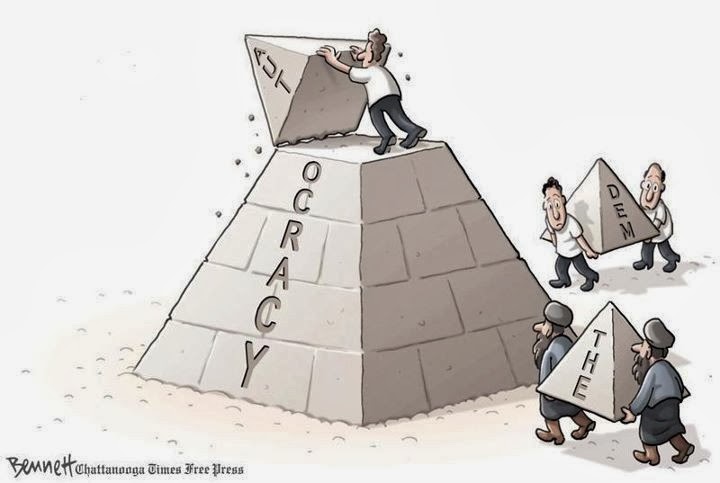
# 1 - Relationship between inhabitants and city administration
Today's Hungarian society is a peculiar blend of Kadarism, capitalism and feudalism. The mayor and the inhabitants are connected in reverse. On one hand, there is a "good mayor's will and everything to deal with" the demand of our parents, but at the moment we rebel when we do not like a decision; just as we relate to our father and mother when they do not give what we want or let us to a party. There is a special amnesia on the part of the mayor about why he was elected and who pays the costs (Kadarism).
Everywhere there is a narrow elite who financially supports the election of a mayor, who is well versed in local investment, and supports the local issues financially, with benefits. Here, for the sake of simplicity, I deny that the local investor in Hungary is usually a central buddy and strummer and that part of the financial contributions are restored to the public by those who offer it because it is gross generalization and not all settlements ( capitalism).
Residents are concentrated in circles of power and information. There are some unhappy peripherals who just see what they show them. There are those who feel within the circle who can hear information from the public hearing and sell it on the virtual information market. There are those in the circle with whom the men of power meet personally, who know a part of reality and eventually have the circle itself that is very small and few people, and that mutual interest holds them in the circle (feudalism).
What is this problem with? The fact that access to information in this particular Hungarian mix is not equal to the citizens, the elected city leader and all the citizens who choose them are mistaken about who is out there.
In this particular mixture, citizens who do not want or cannot participate in the framework offered by the power and the majority established by the power of the circle move to the edge of the circle and are therefore unable to prevent or deal with their rights and their awareness of their duty in the settlement are poisonous situations.
# 2 - Non-cultural decision making
The decision is the right of all elected representatives. In a normally functioning democracy, these decisions are reported by politicians every four years and, accordingly, they receive a new assignment or retire to their civilian occupation.
There is no return from politics in Hungary - with few exceptions - to the former occupation, most of the politicians live in politics, so it is in the primary interest to keep up the power, as this depends on their family's livelihood.
In Hungary, companies are unable to comply with the law if they do not want to go bankrupt because of the extraordinary tax burden and the hundreds of meaningless regulations imposed on them in the absence of mutual trust. In a company, therefore, its elements are reflex to preserve opacity, otherwise, for any political or selfish economic cause, anyone can find any small mistakes of any auditor that they consciously seek when they openly declare themselves.
In today's Hungarian power system, there is no question of transparency or settlement involving residents. There are no systems of decision-making, there is no question of participatory democracy, and not even any democracy, people are ready for facts and are discussing and commenting on the issues presented in the first theme.
In the digital age, participatory democracy is easy and cheap. There are countless ways of involving and consulting people involved in the decision using the Internet. Residents live in a virtual space, and city leaders and company executives have a wealth of tools to choose how to make information available to them, raise important issues that lead the city and the company after analyzing responses. This is impossible in Hungary because of the negative effects of the specific mixed regime described above.
People do not really want to live with their rights and handle as little as possible with their duties until the „good father and mother” give their daily bread (Kadarism). People do not want or can not participate in public life, they tend to keep away from public affairs, and they themselves deny the benefits of doing so, while only enjoying their disadvantage (feudalism). Their position on the social ranks depends primarily on their acquired financial resources, which usually "buy" along their short-term interests (capitalism).
What is this problem with? The fact that citizens are not aware of the information, data that provide the basis for the decisions, has no way of expressing an opinion in the decision-making process, so that they cannot accept the decision, they cannot cooperate in implementing it.
Thus, power gains further benefits by discouraging information, making arbitrary decisions, and citizens calm down to take the loopholes out of the provisions of the ruling because they have decided everything "up there".
# 3 - The Unculturality of Communication
It is a commonplace that communication is the foundation of everything. I think that the above two problems directly imply that the relationship between power and society is their communication. It is obvious that adult communication between peers is to ask questions to each other, to give a meaningful answer to what the other accepts or not.
If we want to express our disillusionment, we make it in a cultured tone, respecting the other person, but in a decisive manner in our own position.
There are no questions in the relationship with children, only statements, no cultural communication, but personality and threats.
The virtual medium is particularly conducive to this, as the emotions control the keyboard sticker, it does not lose sight of it as if it were in a personal situation that it roared out of itself.
What is this problem with? Instead of moving closer to each other by communication, we tend to move away. People cannot even talk in everyday family situations, long-standing family anger and a large number of divorces indicate this. We do not even sit with a neighbor to discuss our common issues, rather we choose the tools of unilateral aggression and encourage the others on the Internet.
If someone tried to make peace between the parties, a meaningful, mind-witting attitude to both sides feels what I'm talking about; what a pitiful and pitiful experiment to attempt adult-to-adult communication where there is no need for it, and the majority do not understand why it would be good. Thus, the other obstacle goes away before the people of power, as it easily shakes citizens by "talking with them meaningfully". Unfortunately, they are right.
# 4 - Unculturality of discussions
Anyone who has ever been on a public forum as a resident of a condominium or as a citizen of a public hearing knows what I'm talking about. The furnishing of the room is already telling. Usually, the management sits on a pulpit, positioned higher than the porcupine, they have refreshment, cake, microphone in their hands, their voices heard well, while the others rest behind each other in rows without water and cake. It is a better case if there is a moderator who leads the conversation, but usually he is a man of leadership, so he is not impartial.
Optionally enter the word, decide who and when to talk, and consequently the whole thing is in a predetermined scenario. In such a lineup, people should be on the soles who ask for a word and make the congregation deliberate. The locally telling people, who behave in a similar way in every social situation, take away their frustration-spelled text, divert the attention and the whole conversation from the point, usually unwittingly, from good intentions.
These forums are usually organized by people of power, the average citizen does not even think that he or she can initiate such things, as the city's buildings are in public ownership and have the right to use it.
In a cultured situation, questions can be collected and sorted in advance. It can be stated that if the forum is for example two hours, then how long does the power body has to answer and an impartial moderator keeps the time. It is not a matter of telling the mayor that his time has expired and factually summed up his message. It raises the questions and does not say the questioner to the pollen. Participants in the forum can be asked with a variety of techniques, whether they are satisfied with the answer or whether they have a specific solution, suggestion. We can create real dialogue by inviting the audience to circles or in a way that they can see each other; the mayor or the board sits on the same level with the others, have the same amount of water and scones on the table as everyone else, indicating that everyone is equal here, only the role is different: one asks and the other answers. The moderator strictly observes the rules and does not allow the emotions to control the conversation.
This is hardly possible in Hungary because of the conditions presented in the first three points.
What is this problem with? The forums are empty, impetuous people dominate, and meaningful citizens conclude that "I'm not coming here anymore".
For a third time, the men of power have come to the conclusion that it is not worth it to settle, and in the hands of the people it remains the demonstration, instead of the meaningful debate, the immediate resistance. Citizens stay away from public affairs and voluntarily deliver themselves and their lives to leaders.
# 5 - Crisis in Culture
I should have started this, but that would have even less understandable. This crisis has been going on for decades, and now I do not want to keep a watch on history, because everyone has gone to school. I'm not talking about history now, but about the fact that there are no basic values that everybody feels from the party or other affiliation.
There are no norms and behaviors that everyone is complying with, whether in the field of transport, work, or within the family. There are no traditions or celebrations that everyone is sitting in the same way, and ultimately there are no exemplars, heroes that everyone sees and looks at them.
What is this problem with? Cultivation is an adhesive that keeps us together and helps us understand what we do and how we do, what to think about good and bad, how to educate our children, how to behave with each other.
This crisis is closely related to the division of society with almost common-sense divisions, as it is precisely at this crisis that people can be gathered together, distracting attention from the point: what are we happy and satisfied with our rights and obligations to live side by side, and how to deal with our common affairs.
# 6 - The lack of community as a viable experience
In American movies, we see the city as a man walking to the baseball team, and if a new coach comes, it is the public affairs of everyone. We can see how they celebrate in picnic parties in the park, talking to people close to each other.
What is this phenomenon? The community where in a church, school, residence, sport club everyone feels that because of this religion, because it involves the child in school, because they live in this neighborhood, because they are sport here, so everything that is happening there the cause of the community.
As a community developer, over the past 25 years, there is a marvelous wonderful, questioning glance at me when I ask the locals who have been heavily distorted by a settlement problem about who to jump out of this word. Normally nothing.
How much did I have to explain to my Western and American partners to finally believe, yes, there is a Hungarian equivalent to the word community, but that does not mean here as well as for them. This word has to be explained and surrounded, as is the case with the service word. Of course, I can translate that this is a service, but we do not mean that it is a service because we have another word for that.
Cultures not only differ in what food is cooked on holidays, but also how many words have their sayings and what they mean. In our community, as a matter of fact, the word is still to be explained, content to be filled.
What is this problem with? The fact that when we have a case that has been resolved to our elected representatives and they obviously cannot solve it or the solution is expensive, corrupt and inequalities, then the community will not immediately come together in our country and begin to take over and help it.
This is about a resource that is a real human resource: the extra revenue from co-operation in a settlement. Use of real, active citizenship.
Thank you for your attention and reading it!
A bejegyzés trackback címe:
Kommentek:
A hozzászólások a vonatkozó jogszabályok értelmében felhasználói tartalomnak minősülnek, értük a szolgáltatás technikai üzemeltetője semmilyen felelősséget nem vállal, azokat nem ellenőrzi. Kifogás esetén forduljon a blog szerkesztőjéhez. Részletek a Felhasználási feltételekben és az adatvédelmi tájékoztatóban.


